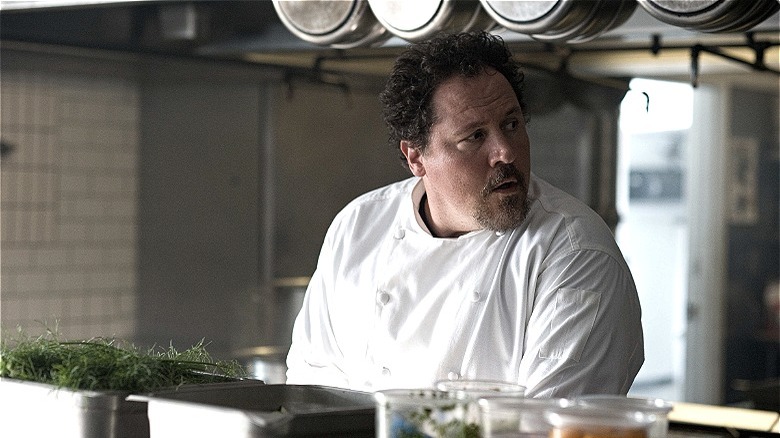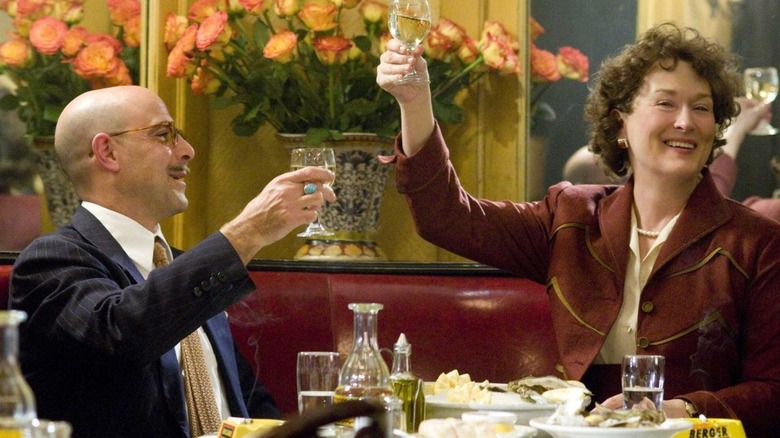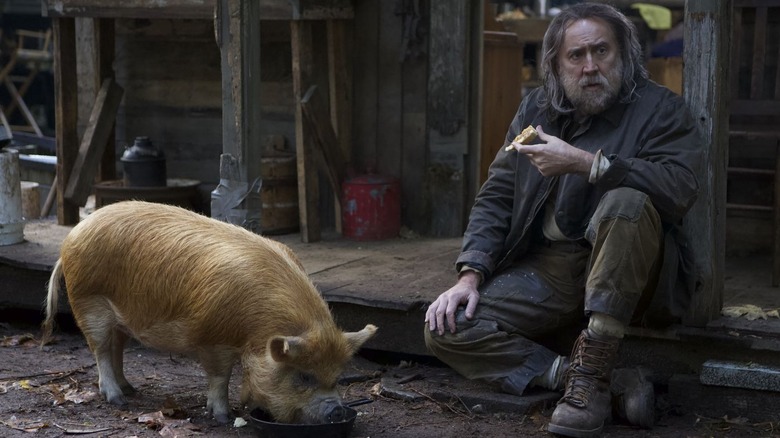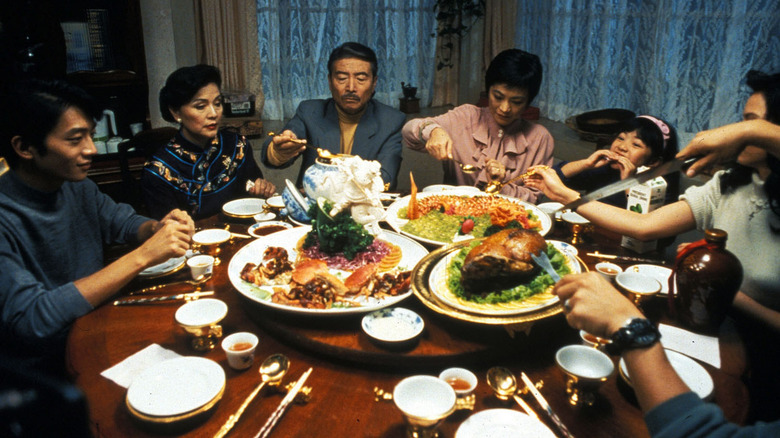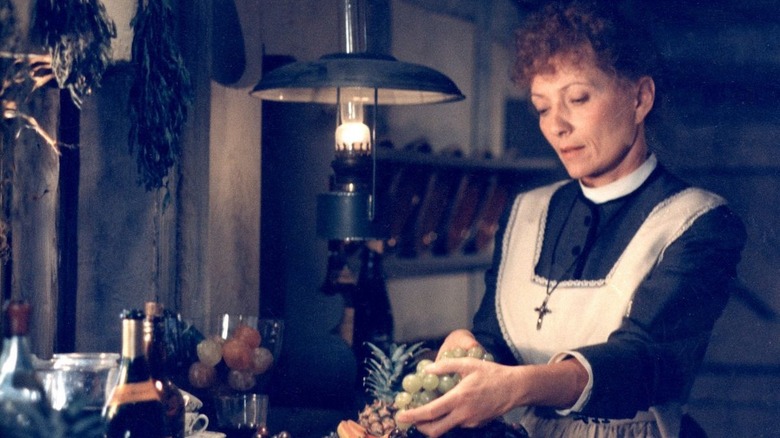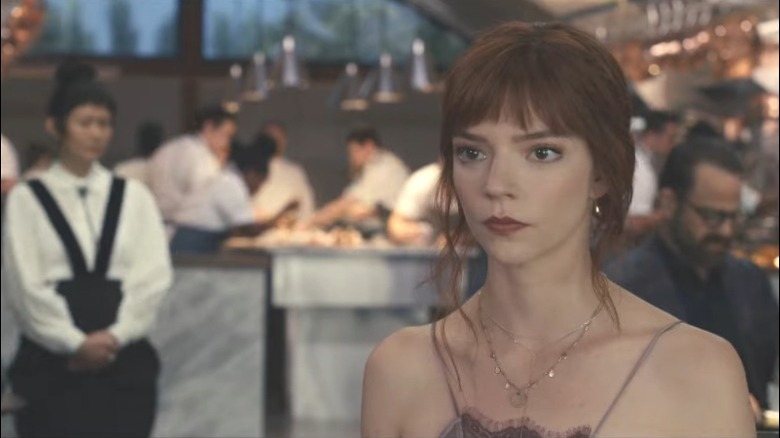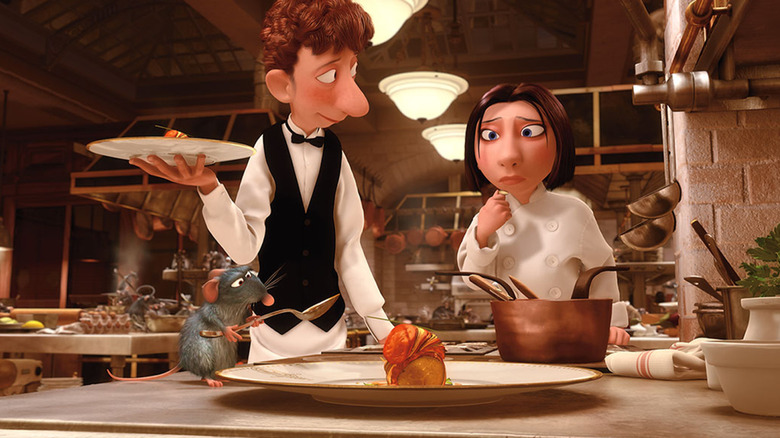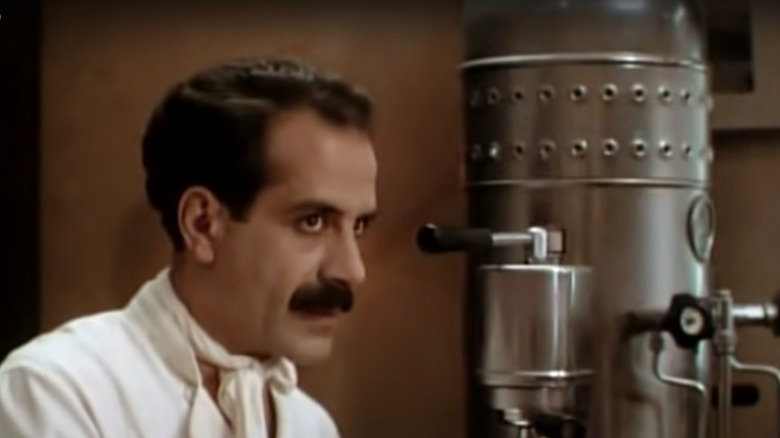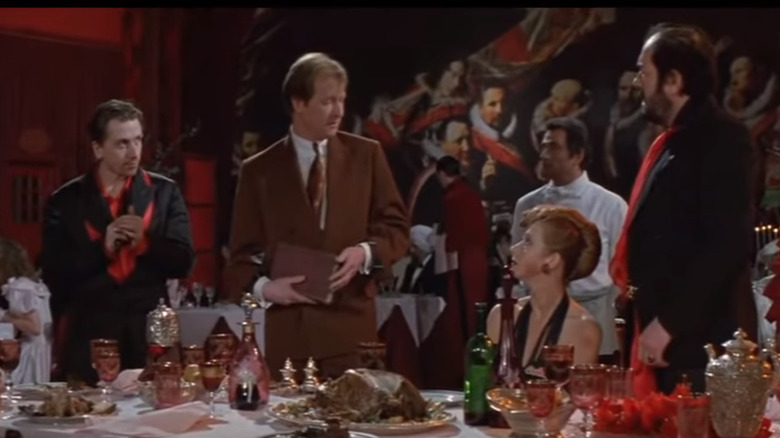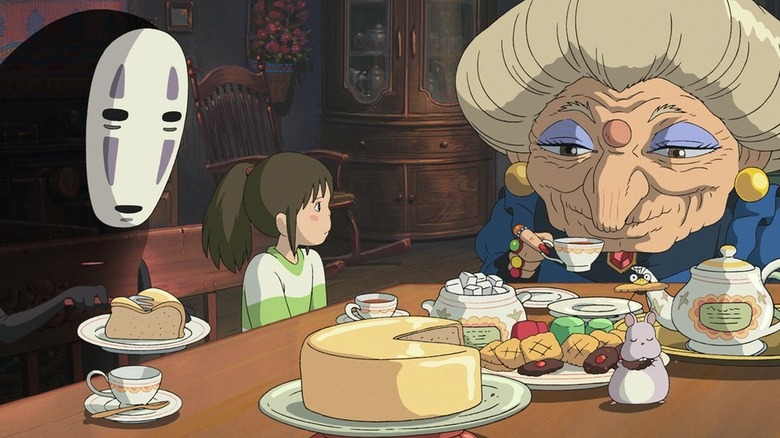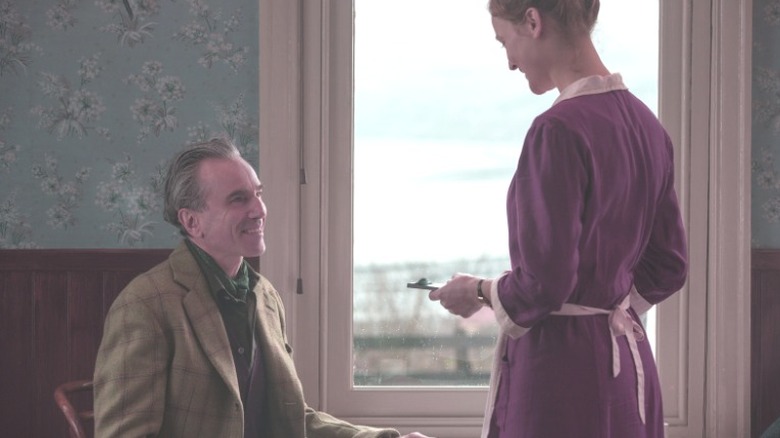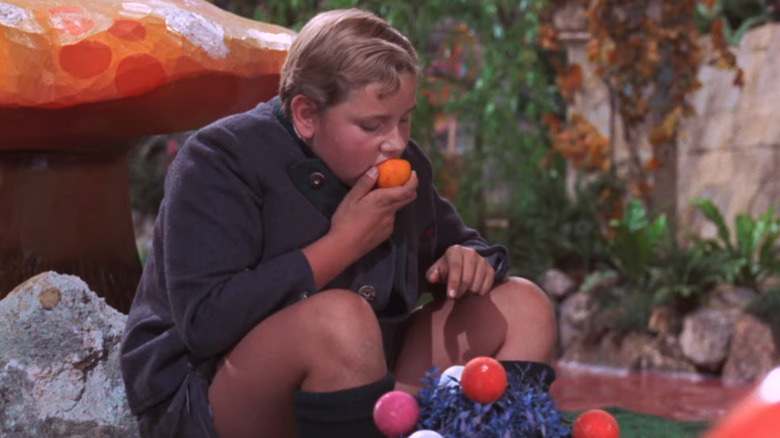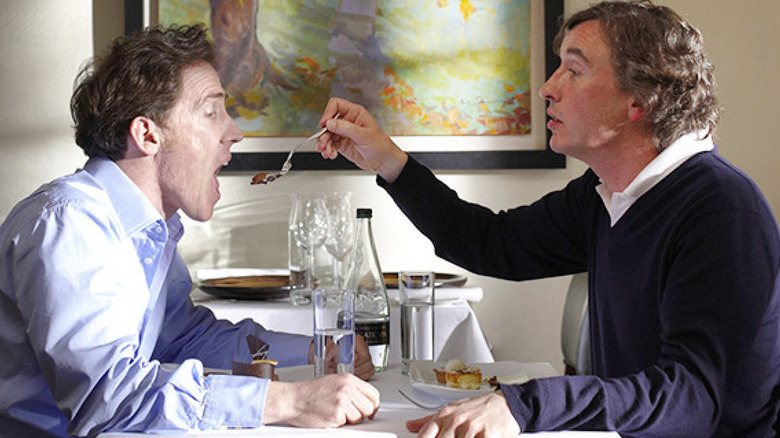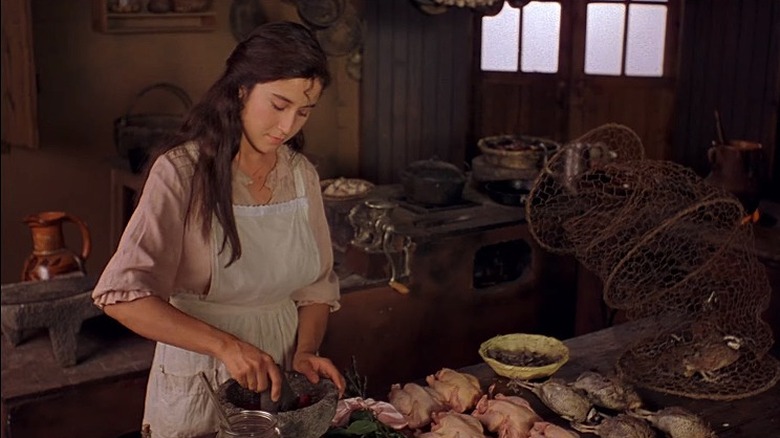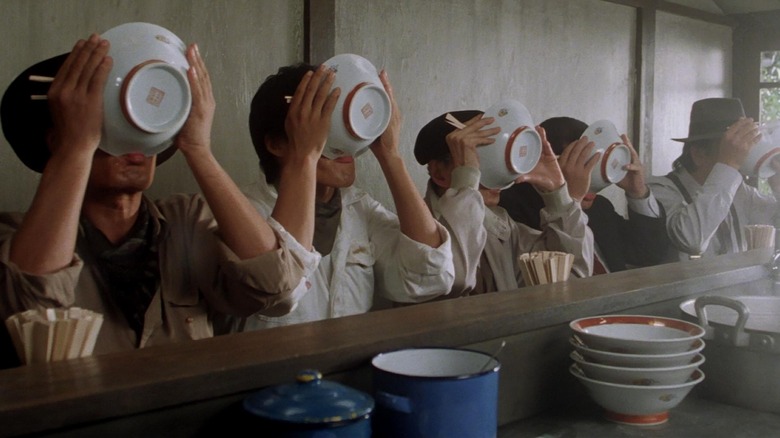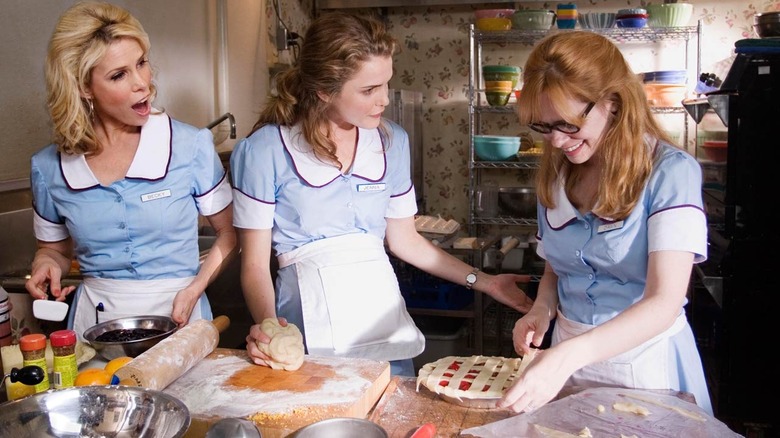The 16 Best Food Movies, Ranked
Food is a universal theme in movies, and what's great about that is the wide variety of traditions, customs, and cultures that go into making foods from around the world so different and interesting. Food is strongly tied to family all over the map, whether it's big events like weddings or a Sunday dinner, or recipes handed down through the generations. Food can also be part of seduction or used in erotic games, and it can trace the arc of a romantic relationship. Food being prepared professionally, in restaurants, always makes for high drama and it's easy to understand why professional kitchens are such frequent settings for movies and TV shows. The tension can be unbearable, but there's also camaraderie amongst the staff, and interesting bonds to be explored with the customers and (gulp) the critics.
Some common themes in food movies are the high culture/low culture dichotomy — the pressure to achieve perfection for gourmet haute cuisine that gains Michelin stars wrestling with the desire to get back to the basics of traditional comfort foods or simple street foods. Every one of the following movies provides appetizing, tantalizing, delicious-looking foods that will make you salivate and set your stomach rumbling. Some of them are childhood favorites, and the food in them can trigger nostalgia, transporting you immediately back to the feeling of enjoying a sweet treat ... and a memorable movie.
16. Chef (2014)
A deeply personal, borderline vanity project for writer, director, and star Jon Favreau, "Chef" takes his real enthusiasm for food and cooking and builds a narrative around it. The movie opens in a high-end Los Angeles restaurant where Carl Casper (Favreau) has been churning out the same fare for a decade. He gets into an altercation with a food critic (which is a running theme in food movies), and at the 50-minute mark the action shifts from Los Angeles to Miami. Favreau's longtime pal Robert Downey Jr appears in an amusing cameo, and then Carl, his best friend, Martin (John Leguizamo), and his 10-year-old son, Percy (Emjay Anthony), drive back to LA in a newly acquired food truck.
The biggest strength of "Chef" is that it's a showcase for street food, including Cuban sandwiches from Miami, beignets from New Orleans, and BBQ from Austin. Another running theme in many food movies is the tension between haute cuisine and down-to-earth "real" food, which we also see in "Pig," "The Menu," and "Ratatouille." Carl finds happiness in the food truck, and it reinvigorates his love of cooking. The biggest drag in "Chef" is that it revolves way too much around Twitter, which feels like extremely obtrusive product placement and has already aged terribly since 2014. Still, "Chef" showcases a grilled cheese that will leave you drooling.
15. Julie & Julia (2009)
Julia Child is having a moment, again. Julie Cohen and Betsy West released their acclaimed documentary, "Julia," in 2021, and in 2022, HBO Max debuted a series, also called "Julia," with Sarah Lancashire playing the iconic French chef. But in 2009, Nora Ephron introduced Child to a new generation with "Julie & Julia," her adaptation of Julie Powell's best-selling book based on her blog. Amy Adams plays Powell, who attempts to cook all 524 recipes in Child's book, "Mastering the Art of French Cooking," in a year. The film is also an adaptation of Child's autobiography, "My Life in France," and it cuts between Powell's life in a tiny Queens apartment in 2002, and Child's (Meryl Streep) life in the 1950s and 60s, mainly in Paris.
Stanley Tucci (as Paul Child) and Chris Messina (as Eric Powell) are both highlights as husbands supportive of their wives' passions. We follow Child as she enters the Le Cordon Bleu school in Paris, where she's surrounded by men, and towers over them at 6-foot-2. The issue with the divided focus is that we don't explore either woman's life in enough depth. Powell's job in post-9/11 Manhattan gets short shrift, and as a result, there are moments you wish Ephron were focusing solely on Child. There is also an unfortunate inclusion of the 2000s perception that all women hate their friends. "Julie & Julia" is still an intriguing time capsule in terms of the then-emerging blog-culture, when the internet was just beginning to explode, but is certainly flawed — and therefore not higher up this list.
14. Pig (2021)
Nicolas Cage is enjoying a career renaissance, and one particular 2021 movie prompted many critics to declare that he'd delivered his first Oscar-worthy performance since the 1990s. In Michael Sarnoski's "Pig," Cage plays Rob Feld, a former celebrated chef who now lives in seclusion in a forest with his beloved truffle-hunting pig. Incidentally, a 2020 documentary called "The Truffle Hunters" makes for a great companion piece to "Pig."
When his pig is stolen, Rob reluctantly makes his way into Portland to track her down. At the mid-point of the movie comes an incredible scene that takes place at a trendy haute cuisine restaurant, where a plate of smoke and foam is placed before Rob. He has a showdown with the chef, Finway (an astonishing performance from David Knell) in which Rob completely deconstructs his high-concept restaurant "experience" far more devastatingly than Finway can deconstruct a scallop to make it feel "foreign." The scene ends with the crushing line, "We don't get a lot of things to really care about." Alex Wolff gives an impressive supporting performance as Rob's associate, Amir. Things come to a head when Rob and Amir make a meal for Amir's father, Darius (Adam Arkin), which has as powerful an emotional pull as Anton Ego's ratatouille in "Ratatouille." "Pig" is about the power of real, unfussy ingredients cooked by people who care about the food and the people who will eat it, and about a meal so good it can live on in the memory for decades.
13. Eat Drink Man Woman (1994)
Ang Lee launched his diverse career with the "Father Knows Best" trilogy, with each entry centering around family, tradition, expectations, and food. The first two follow Taiwanese characters in the U.S., but the third, "Eat Drink Man Woman," takes place in Taiwan itself. The father, Chu, once again played by Sihung Lung, is a master chef who hosts an elaborate feast for his three grown, unmarried daughters every Sunday. Lee explores the daughters' romantic entanglements, but their relationship with the widower Chu is at the center, particularly the bond between him and middle-child Jia-Chien (Wu Chien-lien). Chu also has a close relationship with his neighbor, who is going through a divorce, and her young daughter, Shan-Shan (Tang Yu-Chien). Among the film's highlights are the school lunches Chu prepares for Shan-Shan, which make her classmates envious. Lee also elicits sympathy for Chu, who grows depressed over the loss of his best friend, who was like an uncle to his daughters, and worries that he's losing his sense of taste.
The preparation of the Sunday dinners is a visual delight, with an incredible amount of fish and meat on view, and Chu plucking live fish and chickens from his yard to cook up for his family. After all his hard work, the family bickers about the "over-smoked ham" or "too much ginger," conversations that will be relatable to many. Watching different generations sit down for a Sunday dinner and hearing the kind of conversations that take place shows that food and family are universal themes.
12. Babette's Feast (1987)
This Danish film, set in an isolated religious community in Jutland in the 1800s, is mostly about struggling to survive on meager provisions — until the final act provides a decadent French feast. Sisters Martine and Filippa have lived their entire lives devoted to their pastor father, foregoing suitors and marriage. When their father dies, they attempt to continue his pious way of life, despite divisions in the community. One day, Babette, a refugee from Paris whose family has been killed, arrives at their door and offers to work in return for shelter. The sisters thrive under her care for 14 years, and when Babette wins 10,000 francs, she decides to throw a dinner for the austere community.
Babette sends for extravagant ingredients from Paris, including a live turtle and quails, caviar, foie gras, exotic fruits and cheeses, as well as the best champagnes, red wines, and cognacs. It is revealed that Babette was the head chef at the famous Parisian restaurant, Cafe Anglais. The sisters become worried that indulging in fine foods is a sin, and a hilarious dream sequence makes it seem as though the foods are emerging from Hell. The religious community also makes a pact not to comment on the delicious food, as if this will somehow absolve them of sin. As with many of these foodie films, the pleasure comes in witnessing the preparation and consumption of the wonderful dishes. In this film, it's all about one night of abandon and abundance after years of deprivation.
11. The Menu (2022)
Movies went mad for food in 2021-2022. There were the indie horror movies "A Banquet," "The Feast," and "Flux Gourmet," as well as dramas "Pig," "Boiling Point," and "A Taste of Hunger." And this was in addition to the most critically-acclaimed TV show of 2022, "The Bear." Food played a major role in films that skewer the rich, such as "Triangle of Sadness" and "Glass Onion," but all of these themes came to a head in "The Menu." Nicholas Hoult plays a pretentious foodie, Tyler, who has been stuck for months on an exclusive island restaurant's waitlist. He's finally been selected to enjoy the privilege of paying $1,250 a head and brings along his down-to-earth date, Margot (Anya Taylor-Joy).
Ralph Fiennes stars as the head chef, Slowik, who runs this cult-like restaurant with a rod of iron. Actually, the restaurant is more like an extended community that features farms, herb gardens, fisheries, and smokehouses. Hong Chau plays the formidable hostess to perfection, enforcing the series of strict rules guests must follow. Slowik is all about control, down to the smallest details, and this includes precisely tailoring his dishes to these particular guests. While "The Menu" does have aspects of horror, it is also very funny, especially Hoult's Tyler and his pride in identifying each flavor and ingredient. In a year with a plethora of "eat the rich" movies, "The Menu" is probably the most deliciously entertaining.
10. Ratatouille (2007)
Remy (Patton Oswalt), a rat with an unusual sense of smell and taste and an appreciation for good food, finds himself in Paris and at the restaurant of his hero, the deceased chef Gusteau. We get a rat's eye view of the establishment, which is full of dangers — vast burners, sharp knives, and heavy copper pans all moving at terrifying speed. And he uses his rare gifts to rescue a spoiled soup. Visualizing the sequence with shots of leeks, garlic, and herbs being tossed into the enormous pot by Remy's tiny little rat hands somehow makes the soup seem incredibly appetizing. And that's the gift of great animation, in this case from the maestros at Pixar.
The decision to serve the peasant dish ratatouille to the snobbiest food critic of all time, Anton Ego (brilliantly voiced by Peter O'Toole), is the kind of risk-taking that signifies Remy's genius. The moment Ego puts the fork in his mouth and is immediately transported to his childhood kitchen, where his mother gives him comfort food to soothe the pain of a scraped knee, is among the most truly memorable and stand-out scenes from all of Pixar's exemplary work. Much has been made of Ego's speech about the role of the critic, but the film's overall message that true artists can come from anywhere, regardless of background, is one to be treasured. The impact of "Ratatouille" remains powerful. Look no further than the brilliant homage in the 2022 release, "Everything Everywhere All At Once."
9. Big Night (1996)
Much like Jon Favreau, Stanley Tucci is a real-life foodie who works his love for all things culinary into his projects, among them "Julie & Julia" and the travel/cooking show, "Searching for Italy." He also quite memorably co-wrote, co-directed, and starred in the acclaimed movie "Big Night." Tucci plays Secondo, the younger brother of Italian chef Primo (Tony Shalhoub), who is talented, but his gifts are being wasted on New Jersey criminals who'd order seafood risotto with a side order of spaghetti. The brothers' rival, Pascal (Ian Holm), convinces them that a renowned jazz singer will visit their restaurant, and the titular "big night" is planned, with a sumptuous Italian feast prepared. The star of the show is the Timpano, a pie filled with layers of meatballs, eggs, pasta, and more.
While other movies on this list feature tensions between chefs and food critics, "Big Night" showcases a relationship that will be familiar to anyone who has worked on a restaurant's waitstaff. The customer is always right, but the chef believes he is always right and the waiter (or maitre d') scurries between the dining room and kitchen, desperately trying to keep the peace. The waitstaff's constant mantra is "Don't shoot the messenger." In "Big Night," the plight of two Italian immigrants struggling to make their restaurant work in the face of an undiscerning and undeserving clientele makes for a stirring drama, with tremendous support from co-stars Minnie Driver, Isabella Rossellini, and Allison Janney.
8. The Cook, The Thief, His Wife and Her Lover (1989)
Food is a dominant presence in the films of Peter Greenaway, from the architectural cake in the opening of "The Belly of an Architect" to the decaying foods in "A Zed & Two Noughts," but as the title suggests, his most famous film is set in the world of a high-end restaurant. Michael Gambon is Albert Spica (The Thief), a London gangster who's taken over Le Hollandais, and Helen Mirren plays his abused wife, Georgina. An early scene sees Spica loudly lecture a group of hoodlums (including Tim Roth) on table manners, and how to be a proper gourmet.
This being Greenaway, the production and costume design are the stand-outs. The restaurant is filmed in a giant hangar that doesn't disguise the fact that it's a soundstage, lending everything a heightened theatricality. And Greenaways never settles for subtlety. He delves into the baroque and doesn't shy away from religious overtones, notably with a dishwasher/choir-boy who sings hymns and the staging of the table as the Last Supper (with the enormous Frans Hals painting behind it). The camera tracks from the neon-lit streets where Spica unleashes violence, through the green kitchen, and into the dining room, which is an explosion of red. Look for fascist overtones in the sashes that adorn Spica and his gang, and frequently the tableau is drenched in red Giallo lighting.
Sex, violence, gluttony, toilet humor, and ultimately cannibalism all collide in "The Cook, The Thief, His Wife and Her Lover." Much like an unforgettable meal, it's extremely hard to do justice to such a unique movie in a few brief words. You need to experience it first-hand.
7. Spirited Away (2001)
It's impossible to discuss the best food movies without considering the work of Studio Ghibli. Much of the most mouth-watering food ever put to film has been rendered by the genius artist Hayao Miyazaki, from the eggs and bacon in "Howl's Moving Castle" to the ramen in "Ponyo." It's tough to single out just one movie from the studio, but "Spirited Away" boasts the largest amount and variety of food scenes. From the opening few minutes, in which Chihiro's parents are drawn to a sumptuous buffet in an abandoned amusement park and transformed into pigs, it is clear that food is part of a spirit world that is tempting and tantalizing, but not always to be trusted. There's also the rabidly hungry No-Face, who gorges on endless trays of food in return for gold, and a magic emetic dumpling that causes regurgitation. And who can forget the tea that's served by Zeniba (twin sister of the evil witch Yubaba) with delicious-looking cakes and cookies?
Food in Studio Ghibli movies always looks so appetizing thanks to the waves of steam rising from it, the sound design which adds sizzling or other appropriate noises, and the way they capture texture. For example, No-Face pushing down on a slice of cake with his fork shows how thick and bouncy it is, suggesting it has a soufflé texture like angel food cake. Characters biting into the food always make it seem so appetizing, too, whether it's juicy, crunchy, or soft like marshmallows. We just want to eat it all, but especially the delights in "Spirited Away."
6. Phantom Thread (2017)
Daniel Day-Lewis' last film is ostensibly about a fashion designer, but food is at least as strong a theme as clothes. In Paul Thomas Anderson's "Phantom Thread," the relationship between the fastidious Reynolds Woodcock (Day-Lewis) and waitress-turned-model Alma (Vicky Krieps) can be entirely traced, from beginning to end, by food. Their initial meeting occurs at a British seaside bed-and-breakfast, where Woodcock orders one of the most extravagant and delicious-sounding meals of all time, which includes Welsh rarebit, bacon, sausages, and scones — all washed down with a pot of Lapsang. Once Alma labels him the "hungry boy," her fate is sealed.
Alma moves in with Woodcock, leading to tense breakfasts with Reynolds' sister Cyril (Lesley Manville), and a disastrous attempt to serve him asparagus with butter (instead of oil and salt, the way he prefers it). Things come to a head with a mushroom omelet that leaves Reynolds "helpless and tender" — and with Alma finally gaining the upper hand. Alma constantly provokes and challenges Woodcock, with seemingly innocuous questions such as "Have you had enough to eat? You seem thirsty" becoming teasing and thorny via Krieps' delivery. The scraping of toast is a "distraction" and the arrival of tea is an "interruption." Food brings solace and comfort, but if it's not exactly right, it breeds disquiet, and temper tantrums spew forth from the coddled Woodcock. Food is used to seduce, antagonize, and mollify, and it's ultimately weaponized in "Phantom Thread." Looking back, the film ranks as one of the most complicated and satisfying depictions of a relationship via food of all time.
5. Willy Wonka and the Chocolate Factory (1971)
"Come with me, and you'll be in a world of pure imagination." For a child, food in movies can be wondrous and leave a lasting impression, from the feasts in the Great Hall at Hogwarts to the parade of food before Belle as Lumiere sings "Be Our Guest," and from the fruit and burgers raining from the sky in "Cloudy with a Chance of Meatballs" to the tempting Turkish delights in Narnia. But nothing quite has the impact of Willy Wonka's magical chocolate factory, and most especially The Chocolate Room. We're already halfway through the movie when we get the first big reveal of a river of chocolate surrounded by fields, trees, and flowers which are all eatable (sorry, edible). Even the adults can't help but dive in, scooping cream out of giant toadstools, and unwinding large gummy rolls, and Wonka himself partakes of a daffodil teacup and saucer.
Of course, the food-based fun doesn't stop there. There's the chewing gum that turns Violet Beauregarde into a giant blueberry, the lickable wallpaper, and the giant chocolate bar sent via television. Even before encountering the magic of the factory, the "ordinary" Wonka Bars that are sold to the public sound absolutely delicious, especially the Whipple-Scrumptious Fudgemallow Delight. The store where the classic "The Candy Man" song is performed shows that wonder can be found even in everyday sweets, before the more fantastical creations are found at the factory.
No one can forget watching this movie as a child — and itching to sample everything on screen!
4. The Trip (2010)
A British television series inspired four movies released in the U.S. between 2010 and 2020, each directed by Michael Winterbottom. Steve Coogan and Rob Bryden play fictionalized versions of themselves on restaurant tours of England, Italy, Spain, and Greece. While all four are brilliant works of genius, the first two (England and Italy) are the strongest. All four share literary influences, such as Coleridge, Wordsworth, and the Brontes in England, and Byron, Keats, and Shelley in Italy. One music artist generally provides the soundtrack for each trip, among them ABBA, the Bee Gees, Alanis Morissette, and David Bowie, while Michael Nyman scores grace the quartet of films.
Given England's terrible international reputation for food, it's refreshing that "The Trip" series began there, revealing the Michelin-starred fare on offer in Cumbria and Yorkshire. The cameras glide into the kitchens as food is prepared, and track the real — often very nervous — waiters as they present elaborate dishes of game such as pigeon and rabbit. In Italy, there is (of course) plenty of pasta and a stunning array of seafood, especially at the final location in Capri. Beyond the food, "The Trip" is perhaps best known for Coogan and Brydon's amusingly competitive impressions of Michael Caine, Al Pacino, Mick Jagger, and David Bowie.
The locations, food, music, and humor, coupled with Winterbottom's looks at aging and death, and their constant puncturing of ego, make "The Trip" saga one of cinema's best franchises.
3. Like Water for Chocolate (1992)
Based on Laura Esquivel's debut novel, this Mexican magical realist romance was a hit in the U.S. "Like Water for Chocolate" is an epic that spans decades as it digs into the doomed love between Tita (Lumi Cavazos) and Pedro (Marco Leonardi). The youngest daughter of a strict matriarch, Tita must stay at home, unmarried, so that she can care for her mother until her death. Pedro adores Tita and decides to marry her older sister, Rosaura, which will enable him to remain in her life.
Tita expresses her frustrations, which sometimes spill out into rage and revenge ... via her cooking. That's a tradition that has been passed on by the house cook, Nacha, who is like a grandmother to her. Tita's emotions (including her tears) reveal themselves in the food she prepares, such as a cake for Pedro and Rosaura's wedding that overwhelms the event's guests with melancholy. She also cooks quail with a rose sauce derived from a bouquet that Pedro brings her. Everyone who consumes it, however, is sexually aroused.
"Like Water for Chocolate" is one of the finest examples of a film expressing that food in many cultures — and communities and families — is full of sensuality and emotion. Cooking can also express feelings that words cannot articulate. The film also represents a great instance of Latin American magical realism, with frequently surreal and bizarre moments, such as Tita's middle sister running away naked to join the revolution. A wonderfully funny and sad movie.
2. Tampopo (1985)
Food critics have important roles in "Chef," "The Menu," and "Ratatouille," but one of the best food films of all time is about how, in order for a chef to improve, she must first become a connoisseur and a critic. Goro takes Tampopo to different ramen restaurants to study what they do well and badly, so she can learn and become better. And then, through "Rocky" style training montages and rigorous trial-and-error, she gradually does improve her own ramen technique. The sports movie is not the only Hollywood genre that "Tampopo" parodies, as Goro is very much styled in the guise of a Western cowboy hero.
"Tampopo" brilliantly reflects the many different ingredients in a great bowl of ramen, by inter-cutting the main storyline with other characters who challenge the accepted social norms and etiquettes regarding the preparation and consumption of food. One of the main subplots is in the style of a gangster movie, with a mysterious man in a white suit exploring food in a sensuous and erotic way with his lover. One of the most iconic images from the film is the couple passing an egg yolk from one mouth to another without breaking it. Another comes from the main storyline, when a slice of narutomaki gets flicked onto the face of a character, like the initial gun draw at the start of a standoff. "Tampopo" is one of the most enjoyable food movies of all time, as it champions enthusiasm for the craft of creating and serving dishes in a style that is unique to you.
1. Waitress (2007)
Keri Russell shines as Jenna, a waitress at a pie diner who is determined to leave her abusive husband but finds herself pregnant and too poor to escape. Long before it inspired a hit Broadway musical, "Waitress" was a lovely independent film written and directed by Adrienne Shelly, who plays a supporting role as Jenna's friend, Dawn. Jenna is much more than a waitress; she invents, creates, and bakes the unusual pies that are served at the diner. And, make no mistake, the pies are the real highlights of the film. There's the mouthwatering Marshmallow Mermaid Pie, Spanish Dancer Pie, and the Lonely Chicago Pie, among many others with inventive names and ingredients.
Jenna begins an affair with her OB-GYN, Dr. Pomatter (Nathan Fillion), who listens to her and comforts her when she's feeling completely miserable and hopeless. He also loves her pies. "What you do with food is unearthly," he tells her. "It's sensual." Jenna's conflicted relationship with her unborn child is another unusual aspect of "Waitress," as she feels resentful of the position she finds herself in. The supporting characters, such as Becky (Cheryl Hines), Old Joe (Andy Griffith!), Ogie (Eddie Jemison), and Cal (Lew Temple), populate the diner with believable, if eccentric, personalities. The writing is extremely funny, but also very warm, and the relationship between Jenna and her two best friends is fully developed and wonderful to see, especially when contrasted with something like "Julie & Julia."
It's impossible to watch "Waitress" and not immediately want to head out to the nearest diner for a slice of pie.

